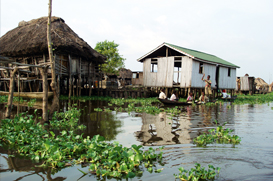Addressing Power Asymmetry: How Transboundary Water Management May Serve to Reduce Poverty

Improved transboundary water management (TWM) can bring benefits for poor people living within shared basins. This report explores how power asymmetry mediates the relationship between TWM and poverty reduction.
It offers an essential message for those designing and leading TWM policy and projects: Failure to engage the basin hegemon constructively will hamper effective TWM cooperation, but the most effective strategy to confront power asymmetries will vary from basin to basin.

Different options to provide strategic support and enable effective TWM are provided to help guide decision-makers towards the best alternatives to fit their local context.
KEY LESSONS LEARNED
- Failure to engage the basin hegemon constructively will hamper effective cooperation on transboundary waters
- The effectiveness of strategies to confront power asymmetries varies from basin to basin
- Effective TWM may contribute to poverty reduction
How to Cite: Zeitoun, M., Jägerskog, A. 2011. Addressing Power Asymmetry: How Transboundary Water Management May Serve to Reduce Poverty. Report Nr. 29. SIWI, Stockholm.



